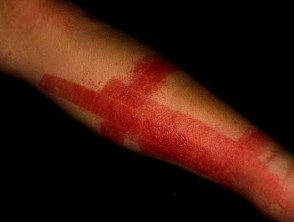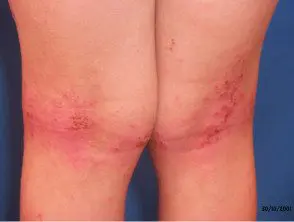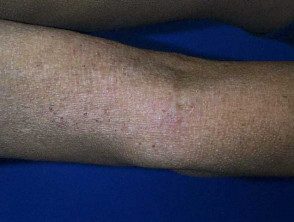What is it dermatitis?
Dermatitis refers to a group of itching. inflammatory conditions characterized by epidermal changes
Dermatitis affects approximately one in five people at some point in their lives. It results from a variety of different causes and has various patterns.
The terms dermatitis and eczema They are often used interchangeably. In some cases, the term eczematous Dermatitis is used. Dermatitis can be acute or chronic or both.
- Acute eczema (or dermatitis) refers to a rapidly evolving red eruption It may be blistered and swollen.
- Chronic eczema (or dermatitis) refers to a long-standing irritable area. It is often darker than the surrounding skin, thickened (lichenified), and severely scratched.
An intermediate state is known as subacute eczema.
Psychological stress can cause or exacerbate dermatitis, presumably by suppressing normal immune mechanisms.
Some types of dermatitis.
- Atopic dermatitis is particularly predominant In children; Hereditary factors seem important, as there is almost always a family history of dermatitis or asthma.
- Irritating Contact dermatitis is caused by body fluids, handling water, detergents, solvents, or strong chemicals, and friction. Irritants cause more problems in those with a tendency to atopic dermatitis.
-
Allergic contact dermatitis is caused by skin contact with substances that most people do not react to, most commonly nickel, perfume, rubber, hair dye or preservatives. A dermatologist can identify the agent responsible for patch tests.
-
Dry skin: especially on the lower legs, it can cause asteatotic dermatitis, also called crackle eczema.
-
Nummular dermatitis (also called 'discoid eczema ') may initially start from a lesion on the skin - scattered coin-shaped irritable patches persist for a few months.
- Seborrheic dermatitis and dandruff are due to irritation from toxic Substances produced by Malassezia yeasts that live on the scalp, face, and sometimes other places.
- Infectious dermatitis appears to be caused by impetigo (bacterial infection) or fungal infection.
-
Gravitational dermatitis arises on the lower legs of the elderly, due to swelling and malfunction of the veins in the legs.
-
External otitis: dermatitis affecting the external ear canal
-
Meyerson nevus - dermatitis affecting melanocytic naevi (moles)
Dermatitis

Acute dermatitis

Atopic eczema

Chronic dermatitis
What is the treatment of dermatitis?
An important aspect of treatment is identifying and addressing any contributing factors (see above).
- Bathrooms Reduce how often you bathe or shower by using warm water. Showers are better. Replace standard soap with a substitute like a mild soap-free detergent - your chemist or dermatologist can advise.
- Clothing Wear soft, smooth and cool clothing; It is better to avoid coarse fibers (wool or synthetic) (microfine merino wool may be suitable)
- Irritants Protect your skin from incontinence, dust, water, solvents, detergents, injuries.
- Emollients Apply a emollient generously and often, particularly after bathing and when itches. Ask your doctor or dermatologist to recommend a few to try; Avoid scented products when possible.
- Current steroids Apply a topical steroid cream or ointment to itchy patches for a course of 5 to 15 days. Your doctor or dermatologist will prescribe a suitable one. Make sure you understand when and where to apply it, and how often you can repeat the course. Steroids should generally be applied once or twice a day only to the red, itchy areas. Sometimes two or more topical steroids will be given, either for different parts of the body or for different degrees of dermatitis.
- Pimecrolimus cream Pimecrolimus is a new anti-inflammatory The cream proved to be very effective for atopic dermatitis, with fewer side effects than topical steroids.
- Antibiotics Your doctor will recommend antibiotics such as flucloxacillin or erythromycin if the infection complicates or causes dermatitis. Infection is most common with Staphylococcus aureus or Streptococcus pyogenes.
- Antihistamines Antihistamine tablets can help reduce irritation and are particularly helpful at night.
- Other treatments Systemic Steroids, methotrexate, azathioprine, cyclosporine, mycophenolate, phototherapy, and other complicated treatments can also be used for severe cases.
Long-term control
Dermatitis is often a long-term problem. When you notice your skin getting dry, moisten it again and carefully avoid using soap. If the itchy rash comes back, use moisturizer and steroid cream or ointment. If you don't improve within two weeks, see your doctor for further advice.
